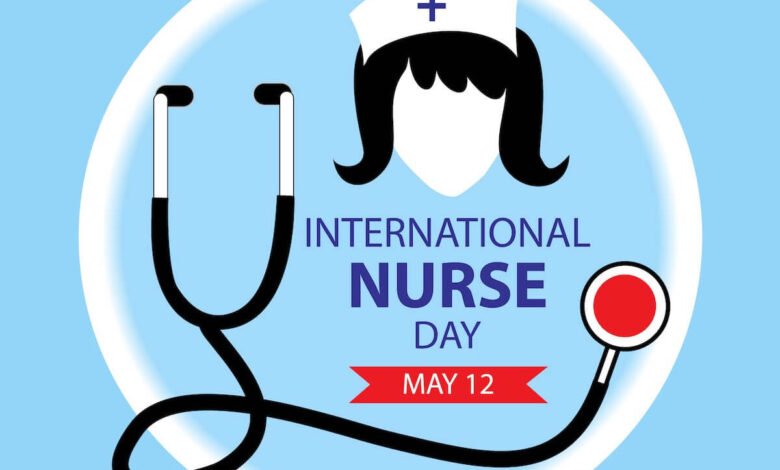International Nurses Day: Honoring the Backbone of Healthcare

Every year on May 12, the world celebrates International Nurses Day, a day to honor nurses for their vital contributions, selfless dedication, and unwavering service. This date marks the birth anniversary of Florence Nightingale, the pioneer of modern nursing.
Across the globe, nurses form the backbone of healthcare systems, delivering compassionate, consistent, and holistic care in hospitals, clinics, homes, and disaster-stricken areas.
Their responsibilities go far beyond bedside care; they serve as advocates, educators, researchers, and often the sole healthcare providers in underserved and rural communities. They are crucial in caring for vulnerable populations like children by offering not only medical care but also emotional support, developmental monitoring, and parental guidance.
Commemorating this day not only pays tribute to their legacy but also underscores the urgent need to invest in, and support the nursing profession in the face of growing global health challenges.
The History of International Nurses Day
The idea of International Nurses Day was proposed to U.S. President Dwight Eisenhower in 1953 by Dorothy Sutherland of the U.S. Department of Health. However, it was in 1965 that it was formally adopted by the International Council of Nurses (ICN), which has since led global celebrations.
The choice of May 12th is symbolic, it marks the birthday of Florence Nightingale, the British nurse whose revolutionary work during the Crimean War laid the foundation for modern nursing practices.
Nightingale emphasized hygiene, discipline, and evidence-based care, significantly improving patient outcomes. Her legacy continues to shape nursing ethics, education, and practice globally, including the care of children and the development of pediatric nursing.
Why Is International Nurses Day Celebrated?
In today’s complex healthcare landscape, International Nurses Day serves a critical purpose. Beyond mere recognition, the day is a call to action:
a. International Nurses Day highlights systemic issues such as workforce shortages, inadequate compensation, and unsafe working environments.
b. It acknowledges nurses’ roles in emergency response, disease prevention, and shaping public health policy.
c. It promotes continuous learning and professional growth among nurses.
d. The day inspires future generations by emphasizing the value, dignity, and purpose of the nursing profession.
The celebration goes beyond a single event, it is part of a broader, global movement to elevate the visibility, voice, and vitality of nurses in transforming healthcare systems.
World Nursing Day Theme 2025
The theme for International Nurses Day 2025 is “Nurses: A Voice to Lead – Delivering Quality, Securing Equity.” This theme reflects the critical role of the nursing profession.
It underscores nurses’ essential roles in ensuring access to quality care and health equity across all communities, especially for children, whose access to consistent, high-quality healthcare is foundational for lifelong well-being.
Aims and Objectives of International Nurses Day
Below are the key objectives of International Nurses Day
- To honor and celebrate the indispensable role of nurses in healthcare delivery.
- To raise public awareness of the challenges nurses face, including heavy workloads, emotional burnout, and workplace hazards.
- To advocate for fair wages, safe working conditions, and career advancement opportunities.
- To promote gender equity in a female-dominated profession.
- To encourage governments and healthcare institutions to invest in nursing education, recruitment, and retention.
Meeting these objectives is vital for building resilient global health systems, especially in times of crisis, such as pandemics, natural disasters, and armed conflicts.
Significance of Nurses in Today’s World
In an era marked by increasingly complex health challenges, including infectious disease outbreaks, mental health issues, etc, nurses remain both the first point of contact and the last line of defense in patient care.
Their roles continue to evolve, encompassing clinical practice, public health education, research, and the integration of technologies such as telemedicine.
Despite their critical role, nurses are often under-resourced and overburdened. Over 80% of the global nursing workforce is concentrated in just half of the world’s countries, leaving vast regions underserved.
Many nurses endure chronic stress, burnout, and even workplace violence. With a global shortage of around six million nurses, both urban and rural health systems are under significant strain.
International Nurses Day serves as a vital platform to highlight these disparities and push for sustainable, systemic reforms.
Conclusion
International Nurses Day is a celebration of resilience, compassion, and hope. It reminds us that the true strength of any healthcare system lies not in its infrastructure but in the dedicated professionals who uphold it every day. Nurses infuse emotion into science and breathe life into medicine. Supporting them is not only a moral imperative but a strategic necessity for global health and the well-being of future generations.





